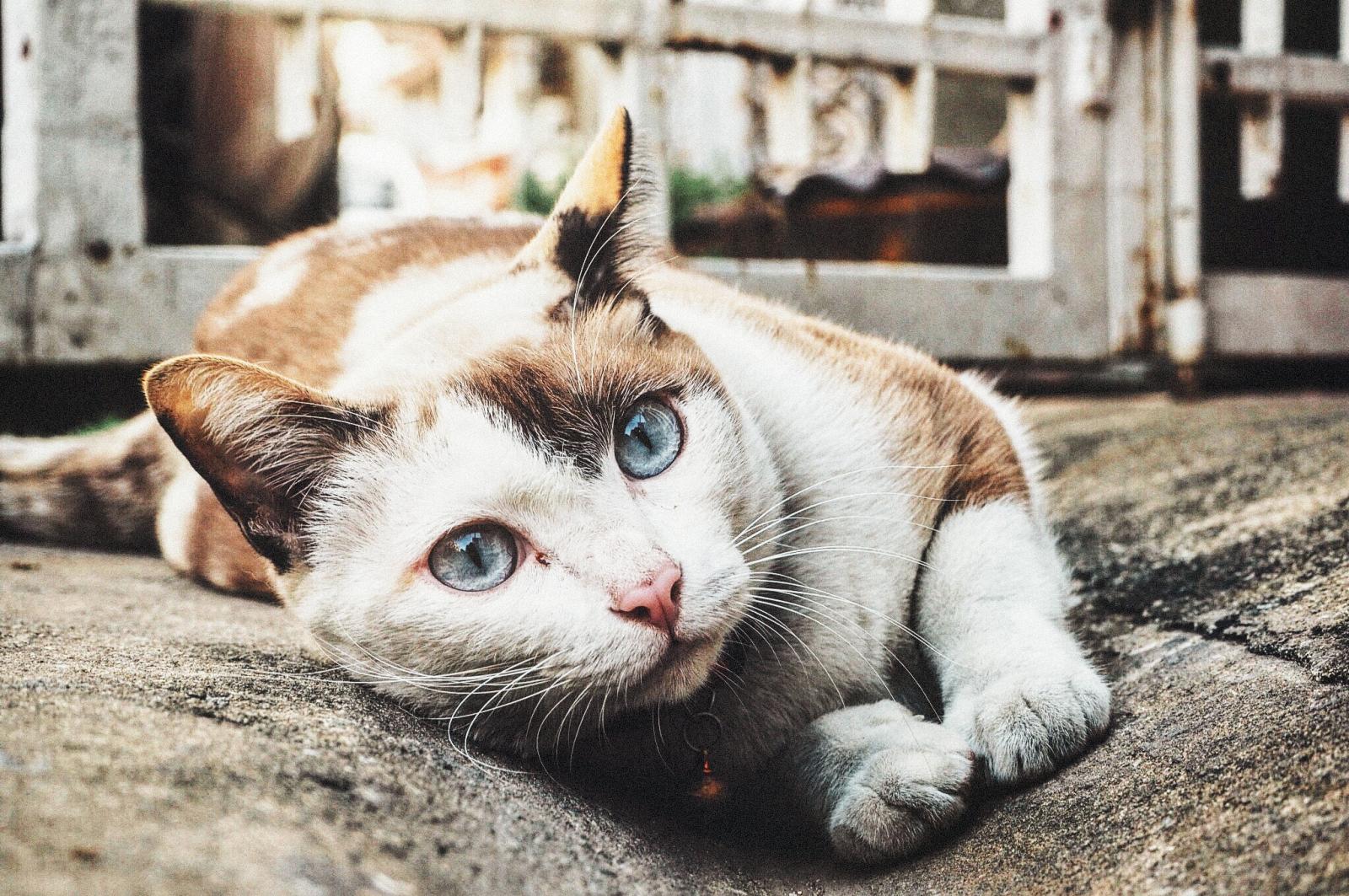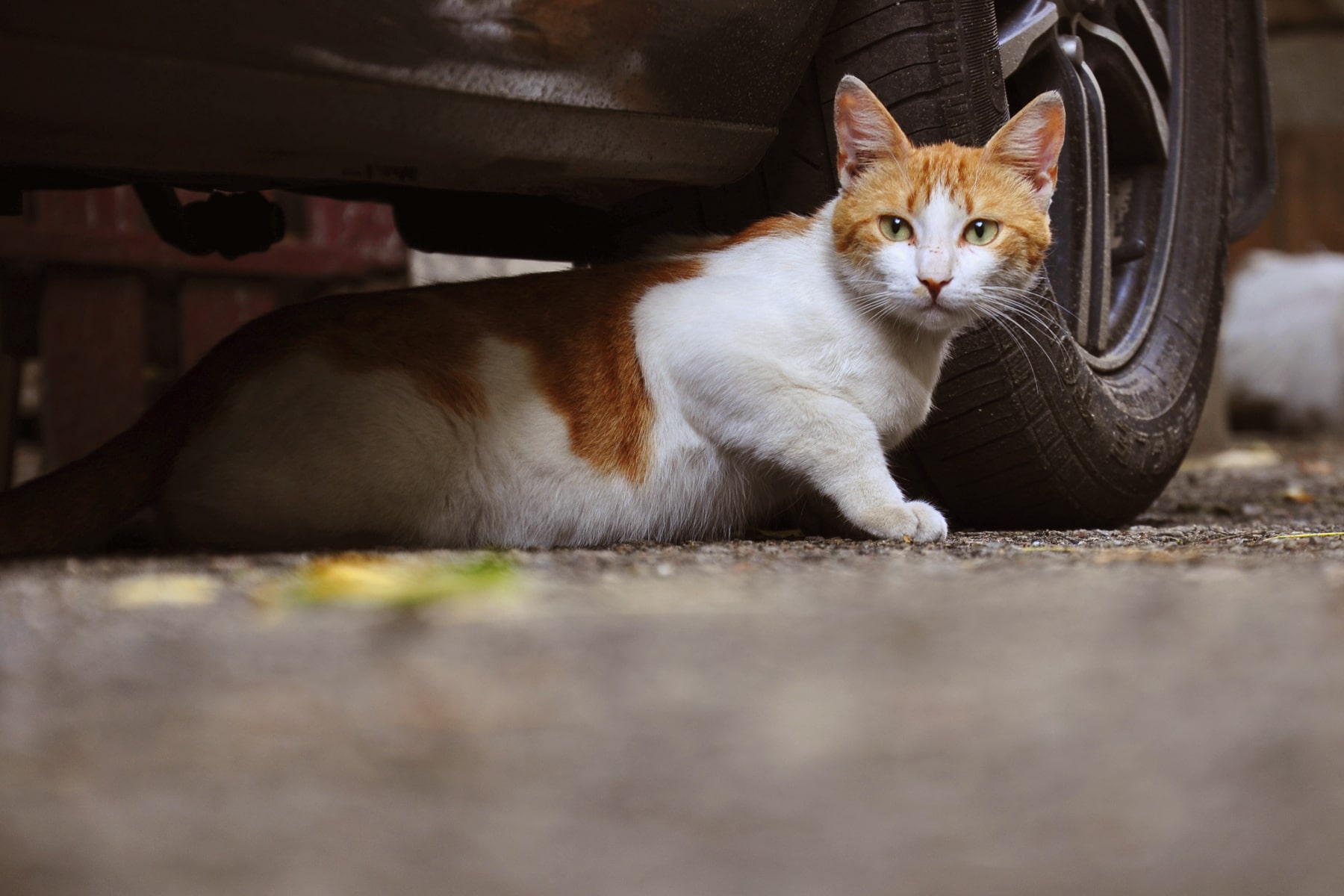
If you are taking care of a feline colony with the arrival of good weather you may have many doubts about how to deworm stray cats, especially if there is one that does not allow itself to be touched. Well, in Noti Gatos we are going to help you.
Then I will explain what can you give your furry so they don't have to worry about external or internal parasites.
Cats that live on the street or in the garden are constantly exposed to pests such as fleas, ticks and mites, which is a problem because they cause them itching and a lot of discomfort, not to mention that they can end with some disease. Fortunately, today we have antiparasitics that repel them, when it comes to deworming an animal that lives outside, What products to use? In the market we find these:
- Necklaces: they are placed around the neck, and their effectiveness has a variable duration. It can be one month or six months. It is not recommended to put it on a stray cat as if it gets hooked somewhere, it could be dangerous.
- Pipettes: they are applied right on the back of the neck and are effective for one month. There are some that also eliminate internal parasites. But of course, to put it on the cat has to be still.
- Sprays: it can be applied all over the body as many times as necessary, taking great care that the product does not come into contact with the eyes, nose, mouth or anus.
Thus, it would only be advisable to put pipettes on those cats that come to us looking for affection, but the rest… no. What do we do with them? It is best to protect the animals from the inside, that is, through their food. We will only have to be aware that each one eats his own, which is easier than trying to keep one still to put the antiparasitic.
Of course, to make sure that each one takes their antiparasitic pill, you have to let them starve a little. You put the pill in a piece of sausage and this in a toothpick -of those who give in Japanese restaurants- and it will surely come close, no matter how distrustful it may be. 😉
Consult with your vet about what type of pill is best to give them, as there are many brands and not all are equally effective.
When should kittens be dewormed?
As a cat owner, you can have a major impact on your partner's health and well-being by carrying out routine preventive medical care at all stages of their life, from infancy to old age.
This offers the best chance of preventing problems from arising or, at the very least, maximizing disease detection early on. The following information is provided to assist you with all the necessary health care your new cat will require ... We are going to focus on deworming cats, although we will comment on other important aspects as well.
Types of parasites that we fight when deworming cats
There are two very different types of parasites depending on where they are located in the feline's body. Next, we are going to tell you some more common points, and below, we will comment on some more in-depth data so that you better know the type of condition in case of not deworming correctly.
- Internal parasites. They are inside the body, mainly in the intestine, but also in the heart and lungs, among other organs. The most common are protozoa and intestinal worms, they can cause serious obstructions and wounds in the intestine. Common symptoms are fatigue, cough, bloated abdomen, poor appetite, diarrhea, and vomiting. You should be especially careful with these parasites if your cat is a puppy, as they can cause growth retardation and even death in more severe cases.
- External parasites. Also called ectoparasites, they live outside animals, either on the skin, on the hair or in the ears. The best known are the famous fleas, which are really annoying for the animal and feed on blood. Mites (cause of scabies), ticks or lice are also in this group.
Deworming in parasites that can be dangerous

Deworming is necessary to maintain the health of cats. Next we are going to talk about this topic.
Intestinal worms / parasites
The most common intestinal worms that affect cats are roundworm, hookworm, and tapeworm. Worms are a common cause of health problems in pets and can lead to loss of appetite, vomiting, and diarrhea.
To protect your cat, common worms can be easily controlled with routine deworming treatment. Kittens need to be dewormed every two weeks until twelve weeks of age, then monthly until six months of age. After six months, all cats should be dewormed every three months for effective protection.
Fleas
If there fleas, they will find a way to put on your cat's hair and will soon invade your home too. There are excellent flea control products available that are safe, effective, and easy to use.
These are administered in a variety of ways. Use flea control products specifically designed for cats. Some common flea control products made for dogs are extremely toxic to cats! Talk to your vet to find out what type of deworming is necessary to kill fleas.
Heart worm
Mosquitoes transmit heartworms when they bite. A cat affected by the heartworm will have an infestation of long, thin worms (up to 30 cm in length!) Lodged in the heart and the vessels that feed on the surrounding blood.
There is no approved treatment for feline heartworm disease, so prevention is essential to give your cat the best chance at a long and healthy life. There is no deworming treatment to treat heartworms, so you will have to protect them in another way.
If you have a cat, whether it is home, but especially if it goes for a walk outside, it is important that you deworm it within the time established by the veterinarians. Only in this way will you be ensuring that you have good health. Your cat's health depends on you.
Vaccination
Some feline diseases are very serious and sometimes fatal even with treatment. You can prevent your cat from contracting these diseases by vaccinating him for life.
When should you vaccinate?
With the recommended regimen, kittens receive their first vaccination at 8 weeks of age. This is temporary and should be followed up with another at 12 weeks. In some cases, a 16-week vaccination may be required. A kitten can safely come out ten days after the final vaccination. To maintain immunity, all adult cats require annual boosters.
What do you need to be vaccinated against?
Vaccines are needed to:
- Feline leukemia virus By attacking the immune system, this virus makes cats more susceptible to infections and diseases, as well as prone to developing certain types of cancer. Symptoms are nonspecific, such as weight loss, lethargy, and poor health. A blood test can detect if a cat is infected, however, there is no treatment for this fatal virus.
- Feline enteritis : the onset of this disease is very rapid and can often be fatal. Symptoms include high temperature, loss of appetite, depression, vomiting, and diarrhea.
- Chlamydophila - Formerly known as Chlamydia, it mainly causes conjunctivitis in young kittens aged 5-9 months.
- Feline respiratory disease Also known as 'cat flu', it causes sneezing, coughing, eye and nasal discharge, loss of appetite, and sometimes ulcers on the tongue. This can lead to severe dehydration and wasting that can be fatal.
- Feline immunodeficiency virus (FIV) - This blood-borne viral infection causes feline AIDS, which is life-threatening. Vaccination is available and will be recommended by our veterinarians if your cat is considered to be at risk. The virus interferes with the immune system, and initial symptoms such as fever, sores, lesions, and diarrhea progress to serious chronic infections as the immune system is overcome. There is no treatment or cure for the virus itself.

We hope it has been useful to you 🙂.

Dear Monica, me again !! A hug, I turn to you because my cat (my affectionate orange tabby who decided to adopt me about 9 months ago) has become a hunter, brings birds and any other victim to my bedroom and eats them !!! I do not know that I am doing wrong the truth or why it does it, I asked a veterinarian, and she told me that it is "normal" and that it dewormed it, but the truth is I live in a stress because it brings them half dead, it ends up killing them in my bedroom and then devours them right there, they tell me that maybe their diet is not good, but I make chicken liver pate mixed with carrots every week and I give them two to three tablespoons a day, plus cat food! I think it is complete, he also varied it from time to time with tuna ..., however, there have been two occasions that I have practically removed the bird from his mouth so that it does not kill him, but now he brings them at night, very rare … ..Even today I thought it was a rat !! And I almost died of fright! It turned out to be a bird again, please what do I do? Why does it act like this? How can I avoid this without the solution being to lock him up because he was always free? There are !!! I love him very much, but it makes my hair stand on end and I need to fix it or adapt, I don't know, I really appreciate your help !!!
Hi Clara.
What you say is normal. The cat is a hunting animal, which is dedicated to catching rodents, small birds, ... in short, everything it can, to feed itself. It is rare that someone who lives at home and has his food plate always full eats what he hunts, but does not take them home. In fact, my own cats have always done the same thing. It is your instinct.
My advice is that you try to adapt. Sorry, no more can be done. It also gives me a lot to see those poor little animals between the jaws of my cats, but that's what it is. It is your instinct. There is nothing you can do but try to keep them from going out at night (which is when they are most active).
A greeting.
I have several stray cats that were born here and have internal parasites, but there is no way they can eat the pills to deworm them, no matter how much I have done, they spit them out… is there any other method other than pills?
Hello isbael.
Try chopping or chopping them and mixing them with wet food. This is how they should eat them.
And if not, Stronghold pipettes prevent and eliminate both internal and external parasites.
A greeting.
I take care of a colony of kittens from large to small I give them food every day and quite good but I do not have money to deworm them, I catch them in trap gaules and take them to the protetora and they castrate them but they do not put any pipette on them, some I see them So bad that I buy it for him and it costs me 12 euros and I can't afford it, could you give me some advice or a home remedy to help them? Thank you
Hello Maricarmen.
En this article We talk about home remedies to deworm them. It may help you.
Greetings.
I adopted a street gayo, 6/8 months old, a couple of months ago.
When we return to the town, which is where we found him, we let him go out to the patio. He is already neutered and dewormed.
But around here there is another cat very similar to him but bigger, which continually comes to meow at my door. My cats get scared and hiss but the other insists. I am not very clear about the intentions of this other cat, I think he lives on the street, although someone should feed him because he looks good and is very sociable with people. What scares me is letting my cat out when the other one is in the yard in case they fight… what do you advise me?
Hello Olga.
Just in case, I do not recommend taking it out when the other is out, since as you say they could fight. It is preferable to let him go out when he is not there.
Greetings.